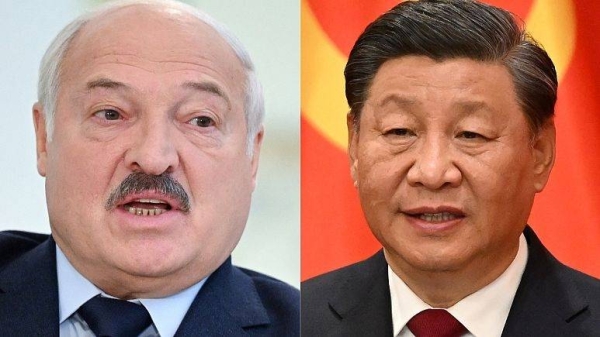
Three women are spearheading a maverick opposition campaign for next month’s presidential election in Belarus, transforming the country’s politics as they attempt to unseat Alexander Lukashenko, who has ruled for 25 years.
At their head is Svetlana Tikhanovskaya, a reluctant candidate who has grown increasingly confident in her challenge to Lukashenko.
Last week Tikhanovskaya delivered campaign speeches on national television and to crowds in their thousands in the capital, Minsk, and in smaller cities and towns.
Initially a stand-in for her husband, a popular blogger barred from running and jailed by the authorities, she has come into her own as a political candidate and is comfortable forming a direct connection with voters, allies say.
“Her growth has been colossal,” said Maria Kolesnikova, the head of the presidential campaign for another opposition politician, Viktor Babariko, also barred from the elections and jailed by the government, who has allied with Tikhanovskaya.
“It needs to be said that she’s an extremely brave and courageous woman. She has taken an enormous load on herself,” Kolesnikova said.
Protests in support of opposition candidates are the biggest challenge in years to Lukashenko, amid anger over his handling of the coronavirus pandemic and grievances over the economy and human rights. As well as jailing his main election rivals, he has detained hundreds of people in a crackdown on dissent.
Tikhanovskaya has also had to make sacrifices. Last week it was revealed that she had taken her children out of the country for their own safety, after she had nearly been driven out of the race by threats against her family. Her husband, Sergei Tikhanovsky, remains behind bars for taking part in a rally in May.
“Yes, I was scared at first,” she said in a televised speech. “I know what depths this government can go to in order to preserve its place. But I am no longer scared.”
At boisterous campaign rallies, Tikhanovskaya and Kolesnikova have been joined by Veronika Tsepkalo, a former Microsoft employee and campaign head for her husband, Valery Tsepkalo, who has also been turfed out of the race and fled the country with his children to Moscow last week, saying he had been warned that an order had been put out for his arrest.
In a bombshell announcement this month, the three women said they would be uniting their campaigns, connecting what are seen as complementary electorates between wealthier urban voters and opponents of Lukashenko in the countryside.
Lukashenko, a former collective farm director, has ruled the ex-Soviet country since 1994, suppressing and jailing opposition figures and holding elections not deemed free and fair by European observers. He is widely expected to use his influence over the electoral authorities to help win the August elections and the opposition has said they are worried that the vote could be rigged.
Kolesnikova said they hammered out the decision to unite in just a quarter of an hour. “We decided it would be quicker for just three of us to talk,” she said. “We needed 15 minutes talking just the three of us, Svetlana, Veronika, and myself, in order to make a decision … And that was our victory.”
The optics of the announcement also caught the public imagination. In photographs, together, Tsepkalo flashed a peace sign, Tikhanovskaya held up a fist and Kolesnikova formed her two hands into a heart. A surge of fan art has followed.
“We believe that we are not of a second sort, that we stand equal to men and believe that we can win,” said Tsepkalo after the announcement, in a dig at Lukashenko, who has said politics should remain a sphere dominated by men.
“Our constitution is not made for a woman,” he said. “Our society hasn’t matured to the point to vote for a woman.” He also referred to them as “poor things”.
Tikhanovskaya has embraced her role as a reluctant candidate, saying she is not interested in running for politics but is doing so from a sense of duty.
“I love my husband so I am continuing his cause,” she told a crowd of several thousand voters in a stump speech in Barysaw on Thursday. “I love my children and want them to grow up in a country where people don’t have their mouths shut. I love Belarusians, so I want to give them the possibility to choose.”
She also appeared speaking in fluent English on a BBC report in a segment that so angered Lukashenko that he called for the news agency to be tossed out of the country, along with local reporters for RFE/RL.












